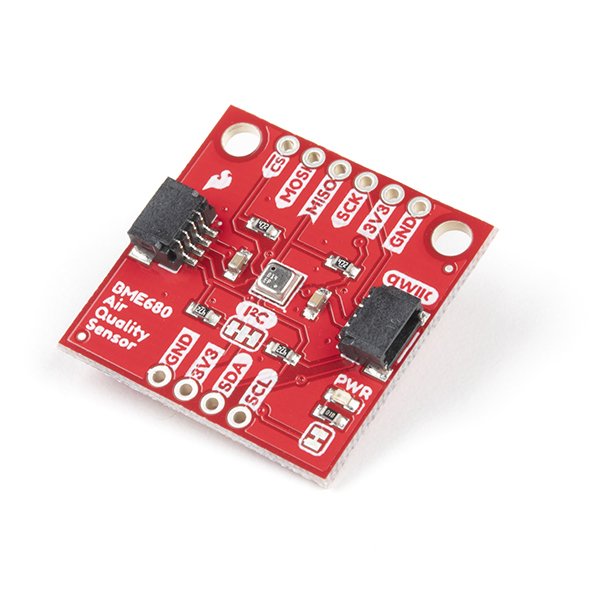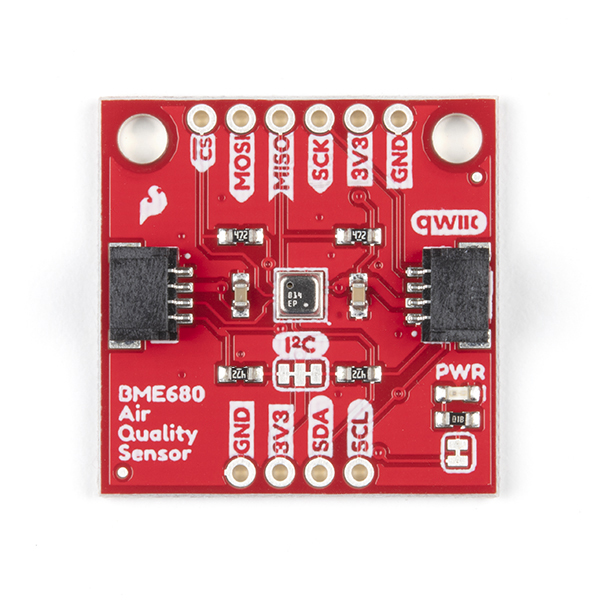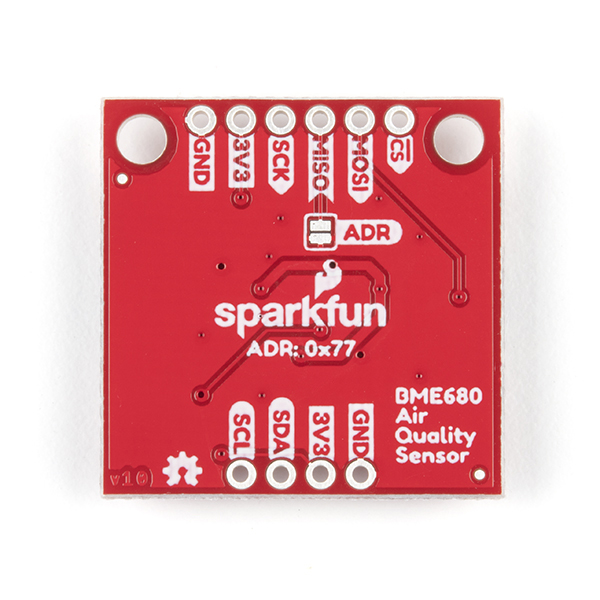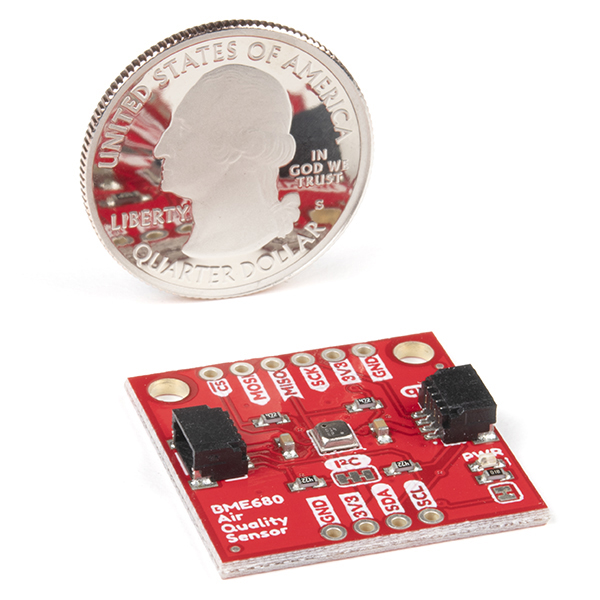SparkFun Environmental Sensor Breakout - BME680 (Qwiic)
The SparkFun BME680 Environmental Sensor is a breakout that combines a gas sensor with temperature, humidity and barometric pressure sensing for a complete environmental sensor in a single package. The gas sensor on the BME680 can detect a wide variety of volatile organic compounds (or VOC for short) to monitor indoor air quality. Combine that with precise temperature, humidity, and barometric pressure and the BME680 can work as a completely standalone environmental sensor all in a 1in. x 1in. breakout!
The sensor communicates via either I2C or SPI. We've broken out the I2C pins to our Qwiic system so no soldering is required to connect it to the rest of your system but if you would prefer, both the I2C and SPI pins are also broken out to standard 0.1in.-spaced pins.
Note: Getting actual indoor air quality (IAQ) from the BME680 can be difficult. If you would like to use the BME680 for precise IAQ measurements, we recommend using Bosch's BSEC Software. If you need a more direct sensor we recommend the SparkFun Environmental Sensor Combo which uses the ENS160 alongside the BME280.
The SparkFun Qwiic connect system is an ecosystem of I2C sensors, actuators, shields and cables that make prototyping faster and less prone to error. All Qwiic-enabled boards use a common 1mm pitch, 4-pin JST connector. This reduces the amount of required PCB space, and polarized connections mean you can’t hook it up wrong.
- Uses I2C interface (Qwiic-enabled)
- I2C Addresses: 0x77 (Default) or 0x76
- 2x Qwiic Connectors
- Operating voltage range
- 1.71V - 3.6V
- Typically 3.3V if using the Qwiic cable
- Relative humidity
- Operating range: 0% to 100%
- Absolute Accuracy: ±3%RH
- Resolution: ±0.008%RH
- Temperature
- Operating range: -40°C to +85 °C
- Absolute Accuracy: ±0.5°C to ±1.0°C
- Resolution: 0.01°C
- Pressure
- Operating range: 300hPa - 1100hPa
- Relative accuracy: ±12Pa (25°C to 40°C @ constant RH)
- Absolute accuracy: ±60Pa (0°C to 65°C)
- Resolution: 0.18PA, highest oversampling
- Gas
- Resolution of gas sensor resistance: 0.05% to 0.11%
- Typical current consumption (varies based on mode and active sensor)
- 2.1µA to 18mA
- 0.15 µA (sleep mode)
SparkFun Environmental Sensor Breakout - BME680 (Qwiic) Product Help and Resources
SparkFun Environmental Sensor Breakout - BME68x (Qwiic) Hookup Guide
May 14, 2020
A hookup guide to get started with the BME68x Environmental Sensor from Bosch. Monitor the air quality, temperature, humidity, and barometric pressure with this Qwiic sensor!
Core Skill: Programming
If a board needs code or communicates somehow, you're going to need to know how to program or interface with it. The programming skill is all about communication and code.
Skill Level: Rookie - You will need a better fundamental understand of what code is, and how it works. You will be using beginner-level software and development tools like Arduino. You will be dealing directly with code, but numerous examples and libraries are available. Sensors or shields will communicate with serial or TTL.
See all skill levels
Core Skill: Electrical Prototyping
If it requires power, you need to know how much, what all the pins do, and how to hook it up. You may need to reference datasheets, schematics, and know the ins and outs of electronics.
Skill Level: Rookie - You may be required to know a bit more about the component, such as orientation, or how to hook it up, in addition to power requirements. You will need to understand polarized components.
See all skill levels
Comments
Looking for answers to technical questions?
We welcome your comments and suggestions below. However, if you are looking for solutions to technical questions please see our Technical Assistance page.
Customer Reviews
4.3 out of 5
Based on 3 ratings:
3 of 3 found this helpful:
Great simple chip!
Hookup was very simple. So far the results seem accurate. I first used the Zanshin BME680 library which was quick and simple to setup. The VOC data is a little odd with that library though (technically it's a resistance value and not VOC). You can see the VOC value fluctuate up/down with the humidity and temp.
After that I used the BSEC library. This was difficult to setup but eventually I got it working. So far the results seem a little more accurate but I'll continue to test it. One note when using the BSEC library, the BSEC library is looking for the chip at a different i2c address than the sparkfun module is on. The sample code needs to be modified to use address 0x77. For example "Bsec.begin(0x77, Wire);
very accurate easy to integrate.
Love this sensor, this is better than BME280 and much smaller form factor easily integratable in wearable.
Nice sensor / bad experience with delivery
Unfortunately I could not find a place for report on your website, the value of sensor plus shipment via UPS toghether brought a problem for the customs here in Ireland they tax my package on top of the both values price+shipment this is the most expensive sensor that I have bought.
Sorry about that, it's hard to avoid the tax man! I don't know how customs works for you but we do have distributors in the UK you might look into. That might help with the customs fees if you purchase through them rather than directly from us.




